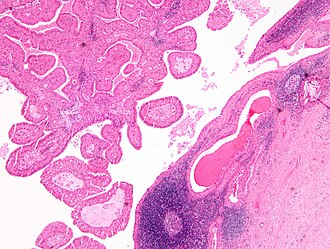Warthin tumour
Jump to navigation
Jump to search
| Warthin tumour | |
|---|---|
| Diagnosis in short | |
 Warthin tumour. H&E stain. | |
|
| |
| LM | papillae with a two rows of pink (eosinophilic) epithelial cells (with cuboidal basal cells and columnar luminal cells), fibrous capsule, cystic space filled with debris, lymphoid stroma |
| LM DDx | lymphoepithelial cyst. |
| Site | salivary gland - parotid gland only |
|
| |
| Clinical history | strong association of smoking |
| Prevalence | uncommon |
| Prognosis | good, benign |
| Clin. DDx | other salivary gland tumours |
Warthin tumour is a relative common benign tumour of the parotid gland. It is also known as papillary cystadenoma lymphomatosum.
General
- Benign.
Epidemiology:
- May be multicentric ~ 15% of the time.
- May be bilateral ~10% of the time.
- Classically: male > female -- changing with more women smokers.
- Smokers.[1]
- Old - usually 60s,[2] very rarely < 40 years old.
Notes:
- No malignant transformation.
- Not in submandibular gland.
- Not in sublingual gland.
- Not in children.
Gross
- Motor-oil like fluid.
- Cystic component larger in larger lesions.
- Small lesions may be solid.
Image:
Microscopic
Features:
- Papillae (nipple-shaped structures) with a two rows of pink (eosinophilic) epithelial cells (with cuboidal basal cells and columnar luminal cells) -- key feature.
- Fibrous capsule - pink & homogenous on H&E stain.
- Cystic space filled with debris in situ (not necrosis).
- Lymphoid stroma.
Notes:
- +/-Squamous differentiation.
- +/-Goblet cell differentiation.
DDx:
- Lymphoepithelial cyst.
- Cyst within a lymph node.
Images
Sign out
PAROTID GLAND, RIGHT, EXCISION: - WARTHIN TUMOUR.
See also
References
- ↑ Chedid, HM.; Rapoport, A.; Aikawa, KF.; Menezes, Ados S.; Curioni, OA.. "Warthin's tumor of the parotid gland: study of 70 cases.". Rev Col Bras Cir 38 (2): 90-4. PMID 21710045.
- ↑ Dăguci, L.; Simionescu, C.; Stepan, A.; Munteanu, C.; Dăguci, C.; Bătăiosu, M. (2011). "Warthin tumor--morphological study of the stromal compartment.". Rom J Morphol Embryol 52 (4): 1319-23. PMID 22203940.


